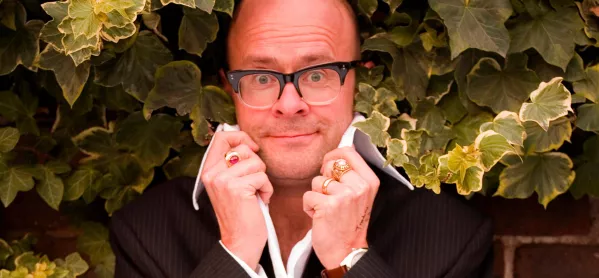Teachers and stand-up comedians are both experts at controlling a room, according to comedian and children’s author Harry Hill.
The TV star says that humour is a vital tool when it comes to ensuring that an audience - or a roomful of pupils - are on your side.
“The easy way to get the audience on your side is to get someone up from the audience and gently take the mickey,” Hill told Tes. “That’s something that teachers can do: some sort of demonstration where a kid helps out.
“Bruce Forsyth used to say, ‘I’m in charge.’ When you go on as a comedian, you have to be in charge. If you’re not, that’s when it goes off the rails. That’s when you get heckled. You have to be the sole focus of their attention. There are parallels with teaching.”
Quick read: Competition looks for Britain’s funniest class
My Best Teacher: Harry Hill: ‘Mr Gillingham’s words always stayed with me’
Book review: The class book review: Matt Millz
Dr Hill was speaking to Tes following the announcement that he would be judging a competition, run by the Beano comic, to find Britain’s funniest primary class.
He said that teacher-training courses would do well to instruct teachers in the art of humour.
He added that he would be interested to see teachers being given lessons in how to be funny. “That’s the $64,000 question: can you make someone who’s not funny funny? Can you just give them tricks?
“I think you can learn to write jokes. They won’t necessarily be able to write brilliant jokes, but you can write knock-knock jokes.”
Harry Hill: jokes in the classroom
Comedians, he added, could inspect - if not heckle - teachers from the back of the class. “It would be interesting to sit at the back of the class and watch the teacher, and give them notes at the end,” he said.
Hill also believes that jokes can be used to teach grammar and vocabulary. “A lot of jokes are just playing with words,” he said. “It’s about words sounding like other words. It’s about grammar, really.
“I think knock-knock jokes and puns could be used as part of lessons about grammar. It’s a playfulness with words, really. It’s part of getting kids to have a delight in words.”
Studying how jokes work, he said, would help children to understand how words function in sentences.
“Basically a joke is just a surprise: hiding the punchline until the very last moment, and then being very economical with it.
“A word here or a word there can make all the difference between being funny and not being funny at all. It’s like poetry in that way: a joke is like a little poem.”
Harry Hill’s new children’s book, Matt Millz Stands Up, is published by Faber and Faber




